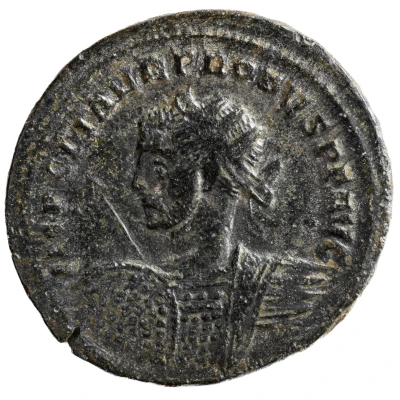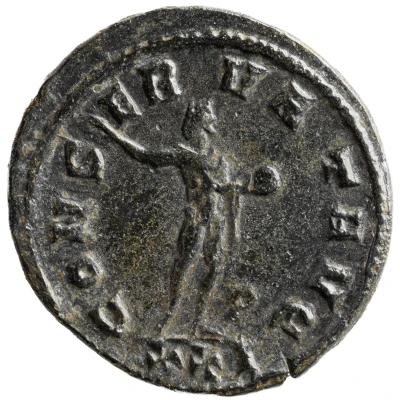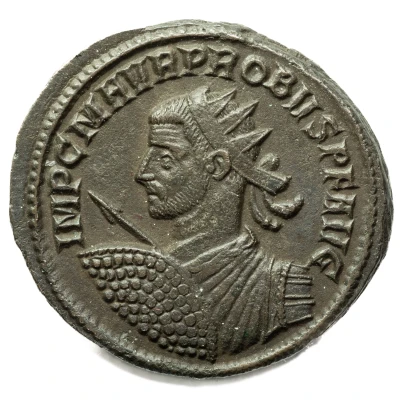


Antoninianus - Probus Cuirassed, left, spear and shield, from behind; CONSERVAT AVG; Sol
| Silver | 3.1 g | 22 mm |
| Issuer | Rome › Roman Empire (27 BC - 395 AD) |
|---|---|
| Emperor | Probus (Marcus Aurelius Probus) (276-282) |
| Type | Standard circulation coin |
| Years | 277-280 |
| Value | Antoninianus (1) |
| Currency | Antoninianus, Reform of Caracalla (AD 215 – 301) |
| Composition | Silver |
| Weight | 3.1 g |
| Diameter | 22 mm |
| Shape | Round (irregular) |
| Technique | Hammered |
| Orientation | Variable alignment ↺ |
| Demonetized | Yes |
| Updated | 2024-10-05 |
| Numista | N#411343 |
|---|---|
| Rarity index | 97% |
Reverse
Sol, radiate, standing left, raising right hand and holding globe in left hand.
Script: Latin
Lettering:
CONSERVAT AVG
In exergue XXI followed by officina mark or in exergue XXI and officina mark in right field
Unabridged legend: Conservatori Augusti.
Translation: Protector of the emperor.
Comment
RIC 670 was minted by the first to the sixth officina of the Siscia mint. The original RIC text mentions 4 different variations/different bust types (bust types according to Pierre Bastiens grouping of bust types; see illustrated: probvs.net), and there are also multiple variants known:
- helmeted, radiate, cuirassed, left, holding spear in right hand and shield in left hand (bust E1, Alföldi 027.073-083 (*) (example: probuscoins #5037), Numista #293026);
- wearing imperial mantle, left, holding sceptre surmounted by eagle in right hand (bust H2, Alföldi 027.056-064 (example: probuscoins #4502), Numista #293690);
- radiate, cuirassed, left with spear (bust F5, Alföldi 027.065 (example: probuscoins #1460), Numista #293691);
- radiate, cuirassed, left, holding spear in right hand and shield in left hand (bust F1, Alföldi 027.067-072 (example: probuscoins #1695), Numista #293692);
- [var] Radiate, cuirassed or draped, left, holding spear in right hand and shield in left hand, from behind (bust F8, Alföldi 027.086-088 (example: probuscoins #1694), this coin);
- [var] helmeted, radiate, cuirassed, right, holding spear (bust D1, Alföldi 027.084-085 (example: probuscoins #4009), not in Numista);
- [var] radiate, draped, right (bust A, Alföldi - (example: probuscoins #4905), not in Numista);
- [var] radiate, cuirassed, left (bust B1, Alföldi - (example: probuscoins #4543), not in Numista);
- [var] radiate, cuirassed, right, holding spear (bust F9, Alföldi 027.066 (example: probuscoins -), not in Numista);
(*) Andreas Alföldi, Vorarbeiten zu einem Corpus der in Siscia geprägten römischen Kaisermünzen. Heft V. Verzeichnis der Antoniniane des Kaisers Probus, Budapest, 1939).
According to Pink, RIC 670, with its obverse legend nr. 3 ('IMP C M AVR PROBVS P F AVG'), is part of the 5th (exergue-/mint mark style: -/-//XXIP) and 7th (-/P//XXI) emission, which was in the year 277 and 280 (Karl Pink, Der Aufbau der römischen Münzprägung in der Kaiserzeit VI/I, Wien, 1949, p. 51, 53).
About the F8 bust variant
This F8 bust is listed as a variant of RIC 670 because it is the only entry in RIC for the Siscia mint with the obverse and reverse legend "IMP C M AVR PROBVS P F AVG" and "CONSERVAT AVG" and the reverse depicting Sol standing to the left.
The F8 bust consists of two versions, both present for this variant of RIC 670:
- Radiate, cuirassed, left, holding spear in right hand and shield in left hand, from behind (example: probuscoins #1694);
- Radiate, draped, left, holding spear in right hand and shield in left hand, from behind (example: probuscoins #3679);
Interesting fact
The Antoninianus - Probus coin was part of a series of coins issued during the reign of Emperor Probus (276-282 AD) to celebrate the military victories of the Roman Empire. The coin features a cuirassed (armored) bust of Probus on the obverse (front side) and a spear and shield on the reverse (back side), symbolizing the military prowess of the Roman army. The coin was made of silver and weighed 3.1 grams, which was a significant amount for a coin at that time. Despite its small size, the coin played an important role in the economy of the Roman Empire, as it was widely used for trade and commerce.

